Jubilation, defiance outside U.S. Supreme Court in wake of Roe v. Wade reversal
Anti-abortion activists say they will now turn attention to states as pro-choice advocates vow to fight on

It was 1971 when a then 17-year-old, pregnant Janet Clazzy had to travel from her home in Florida to New York to get an abortion because it was illegal in her state.
Two years later, the U.S. Supreme Court ruled on a case known as Roe v. Wade, deciding that the U.S. Constitution protects women's right to terminate a pregnancy and the state cannot interfere with that right except in exceptional circumstances.
"It was wonderful," said Clazzy, now 69. "Somebody asked me if I've been protesting for Roe v. Wade all along, and I said, 'No, I didn't think I had to.' Our federal court and Supreme Court are supposed to protect our rights, not take them away."
Clazzy, a retired musician, was just one of hundreds of supporters for abortion rights who gathered in front of the U.S. Supreme Court building in Washington on Friday to express their anger and dismay at the court's decision to overrule that 50-year-old opinion.
The majority conservative court ruled 6-3 to overturn the Roe v. Wade interpretation of the constitution and found that it does not protect abortion rights, opening the way for states to restrict or outright ban the medical procedure.
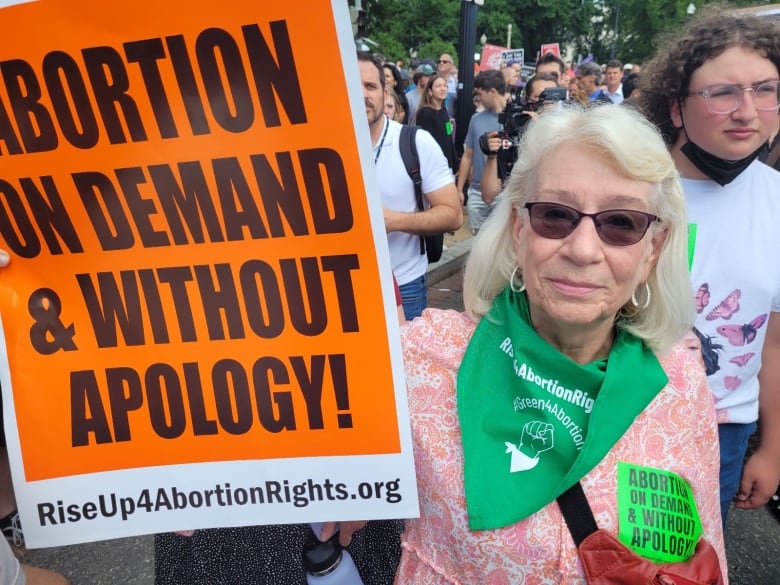
'I'm overjoyed'
For the past couple of weeks, small groups of abortion-rights supporters and anti-abortion activists have gathered in front of the 2.4-metre-tall fence erected around the Supreme Court, anxiously awaiting the ruling. The area had been cordoned off as part of ramped-up security measures in the days after a draft of the court's opinion was leaked.
On Friday, security was beefed up even more and police stood behind the fence, arresting a few who tried to climb it. Some security officials waded through the crowd keeping the peace between opposing groups.
Just past 10 a.m. ET, with word that the opinion on the Dobbs v. Jackson Women's Health Organization, the case being used to challenge the Roe v. Wade ruling, was to be released, both groups grew quieter.
Then, a woman there to protest against abortion grabbed her megaphone and announced: "The constitution does not confer a right to an abortion."
The announcement set off cheers of jubilation from those opposing abortion rights, as they blasted music, popped champagne and started up a bubble-making machine, turning the area where they had assembled into a mini street celebration.
For those who had been hoping Roe v. Wade would not be overturned, the decision was a blow; it sparked tears and disbelief, and chants of "Illegitimate!"

But North Carolina resident Ilona Schwartz was ecstatic at hearing the decision. "I'm overjoyed," she said. "This is the greatest day of my entire life."
Schwartz was already in D.C. when the opinion came down, there for a meeting of the anti-abortion group Students for Life. She was in her hotel when she learned of the decision.
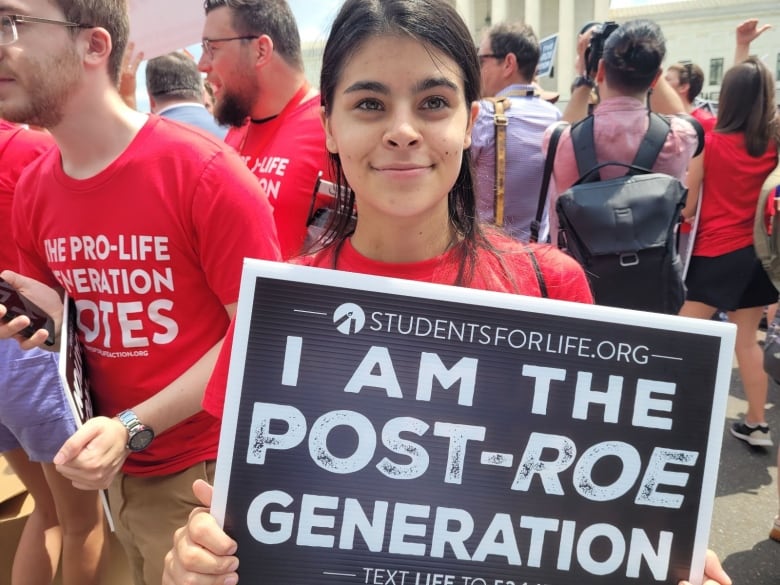
"We all started screaming and jumping [and said], 'We gotta get to the Supreme Court right now,'" she said.
She said she'll continuing advocating to make abortion illegal in her own state.
Lauren Marlow, 22, from Fredericksburg, Va., said she was also excited to be living in "a post-Roe America."
Pro-choice activists say they won't go silently
Later in the day, with many of the anti-abortion demonstrators having left, the area became more of a rally of defiance for the remaining pro-choice crowd. There were frequent loud cheers as speaker after speaker vowed to continue the battle to advance abortion rights, while pleading for everyone to "Rise up for abortion rights."
By early evening, hundreds of supporters of abortion rights, some with their young families, had flocked to the Supreme Court.
Carie McDonald, who had been at the court, awaiting the decision, said she would not accept the ruling and pledged that she would keep fighting for abortion rights in states that plan to make it illegal or strictly regulate it.
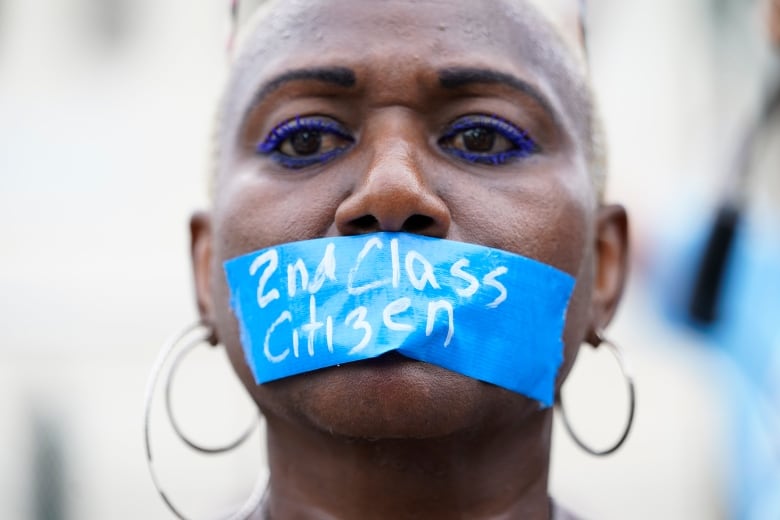
"We are going to fight back," she said. "We are never, ever, ever going to go silently. I don't accept the ruling."
The size of both groups swelled shortly after the decision was released, with people flooding to the Supreme Court, forming a crush of people crowding in to join their respective sides.
"I believe our rights are being taken away,"" said Hanna Fredeen, a 66-year-old retired teacher from Ellensburg, Wash.
"I was in high school in 1973, and I believed my daughter's security and my granddaughter's security would be set for life. And it has been taken."
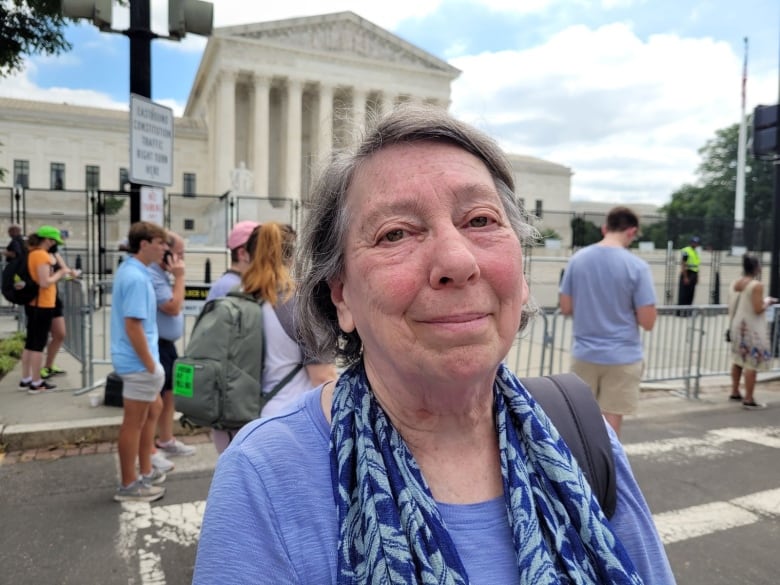
Trisha Maharaj, a 30-year-old D.C. resident who works for an economic think-tank, said she was on a work call when her boyfriend texted her with the news of the decision.
While she expected the decision after last month's leaked opinion, she said she was still "shocked at how crushing it felt today."

"I immediately started crying, which was not a really great work look, but I didn't care," she said. "Then I cancelled that call to come here.
"I didn't know how to keep going to work today because I don't give a f--k about taxes if I don't get to decide what happens to my body."
Abortion 'saved my life,' says activist
Renee Bracey Sherman, 36, was at her home Friday morning, trying to insulate herself from news of the U.S. Supreme Court decision that she feared might come.
She had a bad gut feeling, she said, and just couldn't pay attention to any more updates about the ruling.

"And then one of my colleagues who's an abortion provider, he texted me and the text just said, 'F--k,' and so I knew. And so I cried. And then I just took a deep breath and said, 'I gotta get to the court and get back to work.'"
Sherman is the head of We Testify, an organization that supports women who have had abortions. She was once one of them herself. At 19, she became pregnant while in an unsafe relationship and had an abortion.
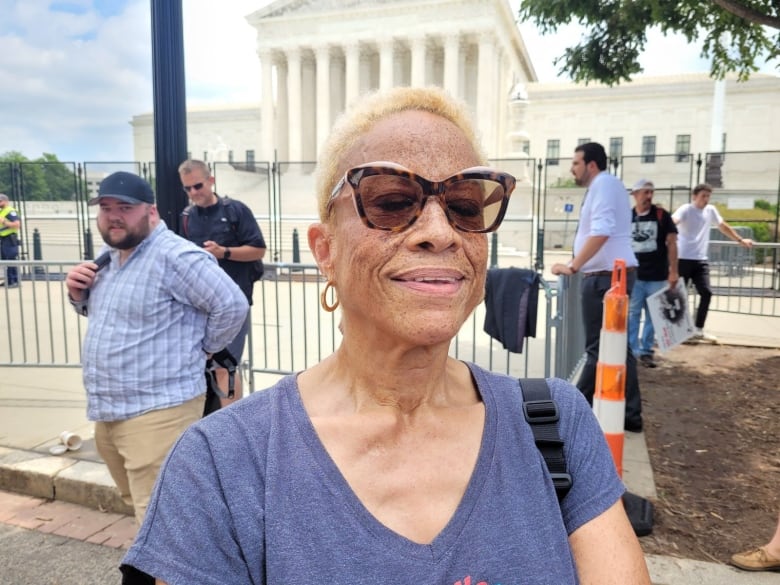
"Abortion has not only saved my life and my future, but also the fact that my mother had an abortion before I was born, that allowed her to leave the relationship she was in and meet my father and have me," Sherman said.
She became emotional when discussing the impact of Friday's decision, saying her first thought was for those who now wouldn't have the same choice she had years ago.
"My heart immediately went to all … the patients who went to the clinics this morning, thinking they were were going to be able to get their abortions," she said in tears.
"They all had hope that they were going to be able to get the care that they needed today."
She said the ruling and the expected rolling back of abortion rights in several states has the potential to destroy "many people's lives."
"We need people to understand this is about the criminalization of pregnancy, in particular [for] Black and brown people."
Fear other rights could be vulnerable
Debra Long-Doyle was also at home when she heard the news and also felt compelled to come down to the court. "To show my support against the abolishment of Roe v. Wade," she said.
Long-Doyle said she feared that this decision was just the beginning of an erosion of rights and that future rulings could seek to roll back things like affirmative action or access to contraception.

An emotional Elizabeth White, who is also a civil rights lawyer, repeatedly shouted "No justice, no peace." She said that in her view, the legal battle has just begun.
"This is the worst news that could come out," she said. "It disproportionately affects brown and Black people. We know that. It disproportionately affects trans people — we know that — poor women.
"But as we have for centuries, we are going to continue fighting."

For those who oppose abortion, the decision was also a signal to keep fighting, but for them, the fight will be to make abortion illegal in states that have said they will continue to support abortion rights and safeguard access to the medical procedure.
Elizabeth Harris, from North Carolina, who works for the anti-abortion group Sidewalk Advocates for Life, said she felt overwhelmed with gratitude at the decision.
She said when the opinion came down, she was with some college students who became very emotional. But Harris said she needed some time for it to sink in. "Being [here] was very powerful, celebrating."
She said her organization does peaceful outreach to women seeking abortions and facilities providing them.
With North Carolina unlikely to restrict or outlaw abortion any time soon, Harris said her work will continue, "because women will always be facing unexpected pregnancies."



